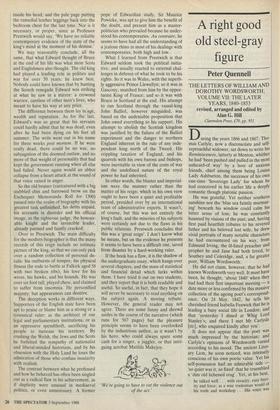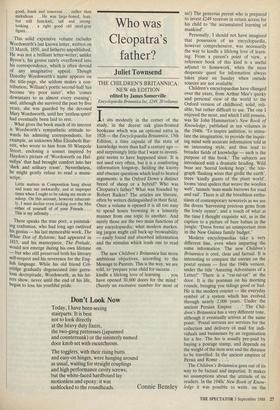A right good old steel-gray figure
Peter Quennell
THE LETTERS OF WILLIAM AND DOROTHY WORDSWORTH, VOLUME VII: THE LATER YEARS, 1840-1853 revised, arranged and edited by Alan G. Hill
Clarendon Press, £70, pp. 951
During the years 1866 and 1867, Tho- mas Carlyle, now a disconsolate and self- reproachful widower, sat down to write his Reminiscences, latterly at Menton, whither he had 'been pushed and pulled in the most unheard-of way' by a host of anxious friends, chief among them being Louisa Lady Ashburton, the successor of his own one-time 'Sovereign Lady' for whom he had conceived in his earlier life a deeply romantic though platonic passion. He was grateful. Yet neither southern sunshine nor the 'blue sea faintly murmur- ing' beneath his window could calm his bitter sense of loss; he was constantly haunted by visions of the past; and, having first paid heartfelt tributes to his revered father and his beloved lost wife, he drew vivid portraits of many notable characters he had encountered on his way, from Edmund Irving, the ill-fated preacher and prophet he and Jane had both loved, to Southey and Coleridge, and, a far greater poet, William Wordsworth. He did not claim, however, that he had known Wordsworth very well. It must have been, he thought, 'about 1840' when they had had their first important meeting — a date more or less confirmed by this massive collection of the ageing poet's correspond- ence. On 24 May, 1842, he tells his cherished friend Isabella Fenwick that he is leading a busy social life in London; and that 'yesterday I dined at Whig Lord Stanley's; and there I met Mr Carlysle [sic], who enquired kindly after you'.
It does not appear that the poet was much impressed by the historian; and Carlyle's opinions of Wordsworth varied according to his mood. The ancient Liter- ary Lion, he soon noticed, was intensely conscious of his own poetic value. Yet his self-possession had an admirable side 'so quiet was it, so fixed' that he resembled a 'dim old lichened crag'. Yet, at his best, he talked well . . . with veracity, easy brev-
ity and force; as a wise tradesman would of his tools and workshop . . . His voice was good, frank and sonorous . . . rather than melodious . . . He was large-boned, lean, but still firm-knit, tall and strong- looking . . . a right good old steel-gray figure.. .
This solid expensive volume includes Wordsworth's last known letter, written on 15 March, 1850, and hitherto unpublished. He was not a brilliant letter-writer; unlike Byron's, his genius rarely overflowed into his correspondence, which is often devoid of any imaginative appeal. Though Dorothy Wordsworth's name appears on the title-page, she seldom makes a con- tribution; William's poetic second-half has become 'my poor sister', who 'comes downstairs to us almost every evening'; and, although she survived the poet by five years, she was guarded by the devoted Mary Wordsworth, until her 'restless spirit' had eventually been laid to rest.
What gives the book much of its interest is Wordworth's sympathetic attitude to- wards his admiring correspondents, for example, an unknown Miss Elizabeth Bar- rett, who wrote to him from 50 Wimpole Street, enclosing a sonnet inspired by Haydon's picture of 'Wordsworth on Hel- vellyn' that had brought comfort into her `dark and solitary room'. Nevertheless, he might gently refuse to read a manu- script: Little matters in Composition hang about and teaze me awkwardly, and at improper times when I ought to be taking my meals or asleep. On this account, however reluctant- ly, I must decline even looking over the Mss either of yourself of of your Friends . . . This is my infirmity . . . .
There speaks the true poet, a painstak- ing craftsman, who had long ago outlived his genius — his last memorable work, The White Doe of Rylstone, had appeared in 1815, and his masterpiece, The Prelude, would not emerge during his own lifetime — but who still preserved both his literary self-respect and his reverence for the Eng- lish language. While his old friend Col- eridge gradually degenerated into garru- lous decrepitude, Wordsworth, as his let- ters show, never until the end of his life, began to lose his youthful pride.











































 Previous page
Previous page